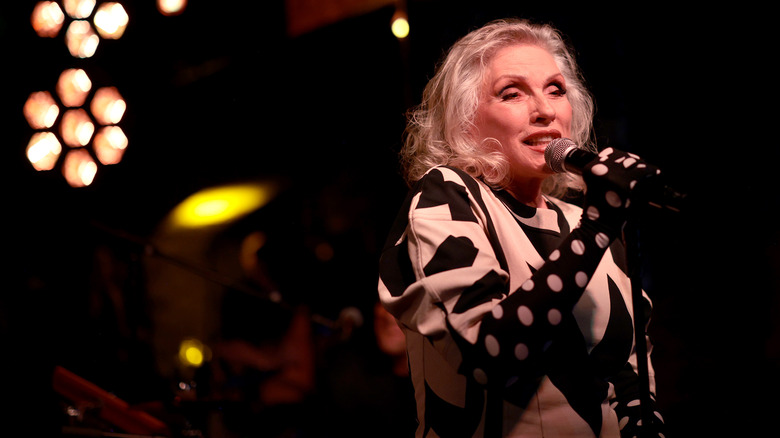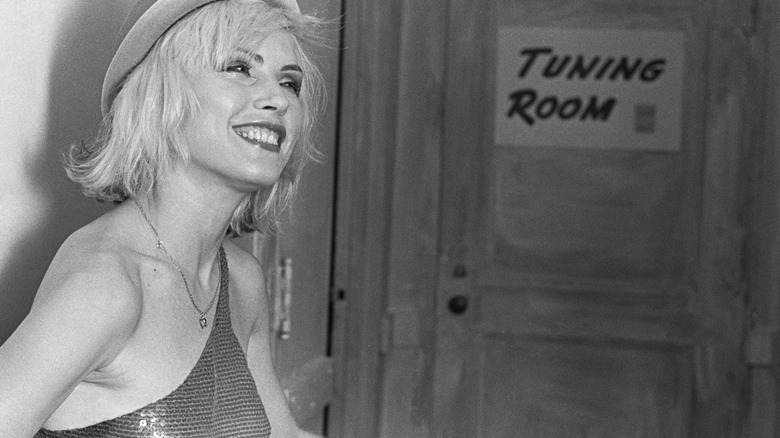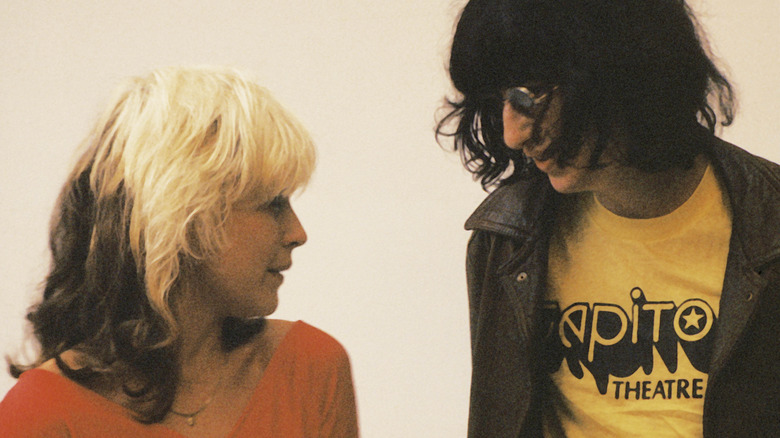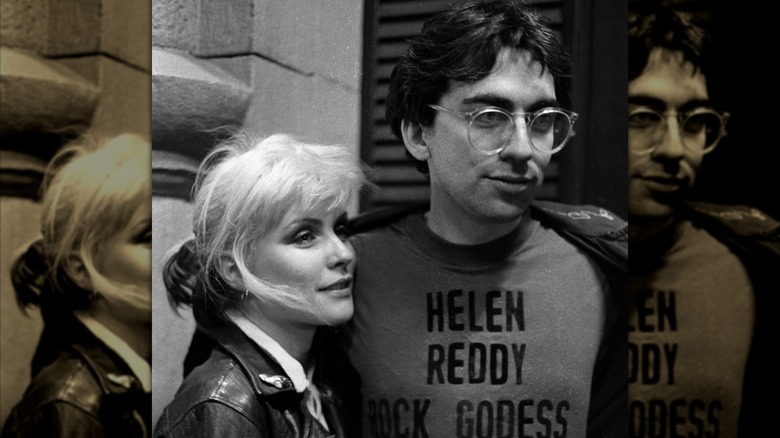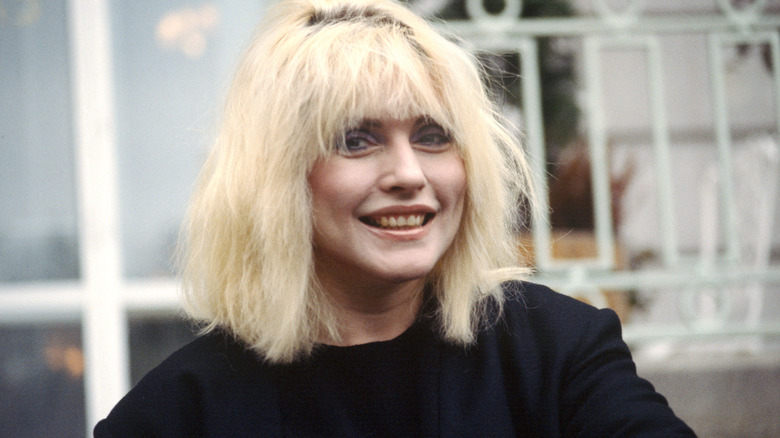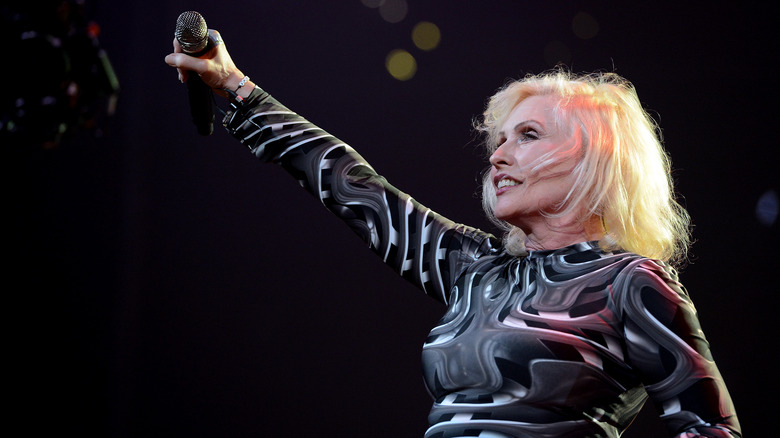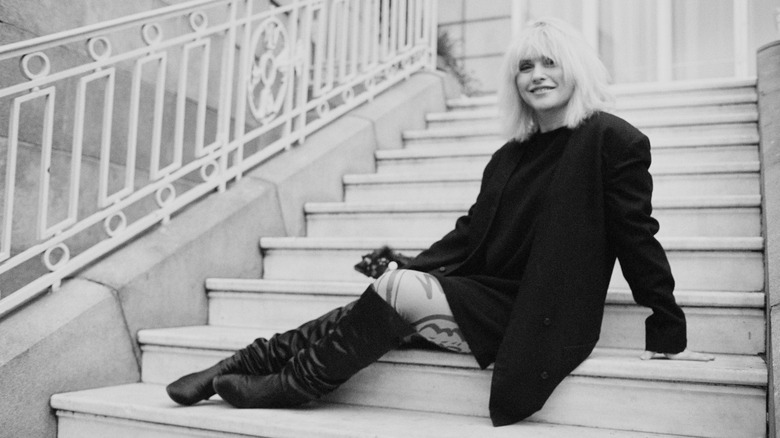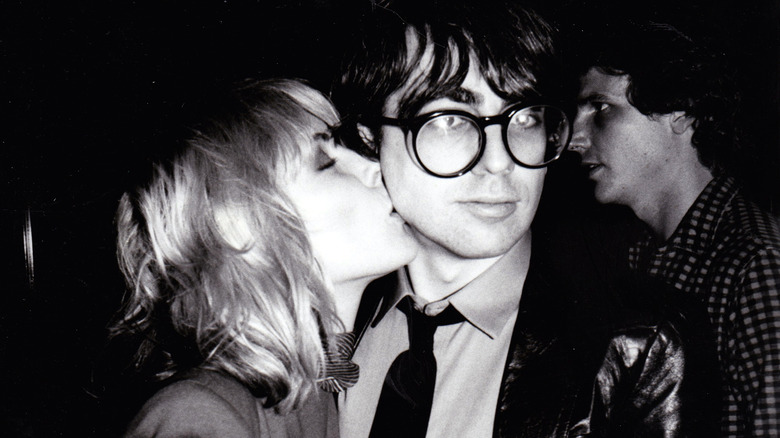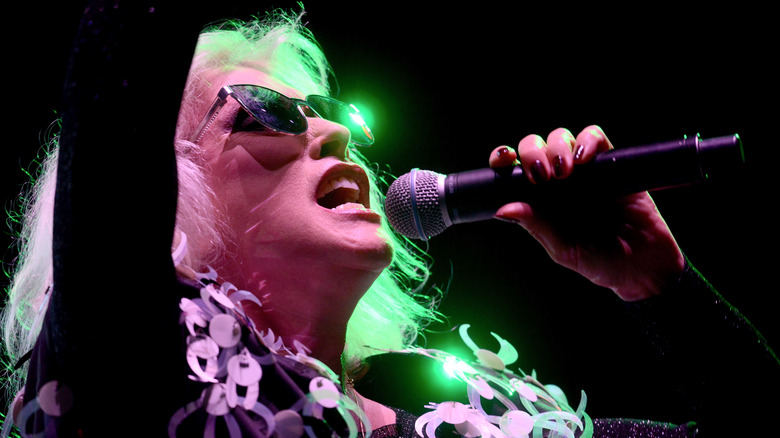Tragic Details About Debbie Harry
When Debbie Harry sat down with The New York Times for the release of her 2019 memoir, she shared the absolutely epic fact that she had saved every piece of fan art that had ever been sent to her. She said that she recognized how much effort and love was poured into tribute pieces — whether they're done by professional artists or kids wielding crayons — and said that she even carried some with her while on tour. "I couldn't just abandon them. [They're] surviving just like me, a bit frayed at the edges, but still intact."
Harry is, sadly, something of a rarity: A survivor of the punk scene, who can look back over the decades with an air of honest clarity ... although she did joke that there were times when that memory got a little foggy, and some parts of her memoir might be best taken with a grain of salt. Still, she said that while hindsight is 20/20, actual regrets were few and far between.
"I'm looking back on all of this in a romanticized light. Memory being what it is. We were struggling, but we were happy for the most part," she said — even through the struggles. And Harry has spoken about those struggles, with some being nothing short of shocking. By 2019, she acknowledged, "The only thing I regret is I can't wear heels anymore," and honestly? What more can anyone ask for? Especially considering some of the heartbreaking times that Harry had to face.
The following article includes allegations and descriptions of addiction and sexual assault.
Her attempts at finding her biological parents ended in heartbreak
Debbie Harry was adopted, and in her case, that was as far from tragic as it gets. When Cathay Che interviewed her for the book, "Deborah Harry," she said that she grew up with loving parents, a wonderful sister, and — although she hated school — she always found solace in singing. She did, however, try to reach out to her biological parents.
It really didn't go as she may have hoped. She explained that she had hired someone to help find her biological mother: "The detective tried to ask her a few things but I think her exact words were, 'Please do not bother me ever again. I do not want to be disturbed.' He didn't even get anything out about who I was." And her father? He had already passed away.
Harry revealed that she had somewhere around seven or eight half-siblings that she didn't know, and explained the circumstances of her birth. Her mother apparently didn't find out the man she was seeing was married — with multiple children — until she realized she was pregnant. "She was heartbroken and she went away, had me, and put me up for adoption. I don't know much more than that," Harry said. She said that although it didn't play out like she'd hoped, she knew that she had at least made the effort: "I thought I was doing the right thing, and I still feel I did the right thing for me."
She denied spiking Dee Dee Ramones' drink ... and had a very good reason for not doing it
The rock scene of CBGB's was like a who's who of punk rock, and in hindsight, it had to be pretty incredible to be on the front lines. Apparently, though, it wasn't all fun and games: When The Ramones sang "Something in My Drink," they were singing about a very real incident where someone spiked Dee Dee Ramones' drink. (And it's still happening: In 2022, The Guardian reported at least 15% of women and 7% of men had their drinks spiked, and it's assumed that's on the low end since it's not always reported.)
When Cathay Che interviewed Debbie Harry for her book, "Deborah Harry," the incident was brought up. Why? Ramone had once said that he suspected it had been Harry who spiked his drink, and she was horrified at the accusation. It takes a special kind of terrible person to think it's hilarious to spike someone's drink, and not only that, but Harry said she had a very good reason for never doing it.
"Especially having had it happen to me, I would never do that to anyone. Someone did it to me once at Studio 54 and it was the most awful experience of my life. It was this horrible, endless night of vomiting and hallucination. ... I wouldn't do that to anyone."
Being sexually assaulted brought up complicated issues
Debbie Harry has been candid about the fact that superstardom doesn't get rid of the sort of feelings that mere mortals struggle with. She told The Guardian that her entire life has been clouded by a fear of abandonment stemming from her parents' rejection, and she's also spoken about how she was impacted by an incident in the early 1970s, when she and then-boyfriend, then-bandmate Chris Stein (pictured) were attacked outside their apartment. They were forced inside, bound, and then, Harry was raped.
For Harry, she says that the worst part wasn't physical, but mental — and the fact that when her attacker stole their guitars, he stole their livelihood. "I was angry and I felt victimized. I wasn't beaten or harmed physically, it was all emotional or mental. Being raped ... by some stranger against my will at knifepoint, you know ... It wasn't a happy moment in my life."
Harry says that with Stein's help, she moved on from the incident, but she's spoken about how there were times in her professional life when she felt just as violated. When she posed for a poster in a mostly transparent top, a full to-the-waist image of her appeared on the poster for "X Offender." She explained to iNews why she had been livid: "Rock n' roll and pop music are about sexuality, so I didn't have a problem with that. But they told me they were gonna use the picture in a cropped format — that was the violation."
She was stalked by a boyfriend
It's well-known that stalking is a massive problem: About one-third of women (and one in six men) have reported having to deal with a stalker (per the CDC), and Debbie Harry is one of those women. When she sat down to speak with The Irish Sun, she shared that she was stalked by a former boyfriend after she ended the relationship. She's only identified him as "Mr. C," and said that things escalated to the point where he broke into her apartment, threatened her, and even pulled a knife on her. He followed her when she moved to New York City, and in hindsight, she said that the worst part wasn't even his actions.
"I went to the police and complained, but they said, 'We can't do anything until he hurts or molests you.' It was awful," she said. Decades later, she said the sting of that entire section of her life was less about what he did, and the complete and utter lack of help or compassion she found when she went to authorities. "Having a voice is very, very important," she explained. "... I shudder to think what it must be like in some countries ... a horror."
Who was she nearly abducted by?
One of the more infamous stories about Debbie Harry is her story about getting picked up by, and then escaping, a guy she firmly believed to be Ted Bundy. When she spoke with Rolling Stone, they said they were just grateful that she was able to get out of that situation. She said. "You're one of the few people who's actually said that. ... Nobody says, 'I'm glad you made it.' I'm glad, too. Thank you."
When she told the story in 1989 (via Snopes), she said that she was trying to get across town, when a guy in a white car pulled over and offered her a ride. She got in, tried to roll down the windows, and realized there was no door handle and, in fact, not much of anything else in the stripped, bare-bones, and escape-proof car. Fortunately for her, the window was already cracked just enough that she could get her arm out to open the window from the outside, and she fled.
The timeline of Bundy's life doesn't put him in the area at the time, and many think it's been debunked. But brushing aside her experience would be callous, to say the least: Harry said she had recurring nightmares afterward and eventually turned to the artist Robert Williams, who put those fears on a canvas and helped her deal with the dreams. The question remains, though: If it wasn't Bundy, who was picking up women off the New York City streets, in a car that was clearly outfitted to be inescapable?
She says her depression turned her to drug use
Debbie Harry might own any stage that she steps onto, but she's been pretty straightforward about how being shy comes more naturally to her. She knew that wasn't going to work on the stage, though, and says that she did what was needed to go grab the audience: "There was no going back!" she told the Belfast Telegraph. That's not to say that things were easy, though, and Harry acknowledged that when she found herself struggling with an overwhelming depression, she turned to drugs — particularly, heroin.
She told The Irish Sun: "For those times when I wanted to blank out parts of my life, or when I was dealing with some depression, there was nothing better than heroin. Nothing. No one thought about the consequences. I can't remember if any of us even knew the consequences." Harry has said, though, that she never let it get all-consuming, and when it became too much of a hassle, she decided she was done with it.
She's also hinted at the fact that she's faced depression, along with a realization over the inevitability of aging, too. She's been open about the fact that she's had plastic surgery done, and when The Guardian asked her about it in 2011, she said, "It gave me a certain encouragement and satisfaction. ... Everyone, at some point, has a realization about their longevity, or lack thereof. How you respond depends on how much you like living."
Her age and his illness ended Blondie
Could Blondie have done so much more? It's impossible to tell, but according to what Debbie Harry told iNews, the powers-that-be had already put a clock on their popularity because of her age. She was 33 when "Parallel Lines" hit, and she shared, "Age prejudice is very, very strong and even more so in the corporate world." The end of Blondie, it turned out, would be the perfect storm of misfortune, spearheaded by a mysterious illness that devastated guitarist and songwriter Chris Stein.
They were still packing stadiums when he came down with a mysterious illness that doctors just couldn't diagnose. "We thought it was strep, Chris thought he had AIDS or cancer, or he was dying," Harry wrote in her memoir (via Ultimate Classic Rock). He was ultimately diagnosed with an autoimmune disorder called pemphigus vulgaris, and according to the Mayo Clinic, one of the first symptoms is painful blisters. It was such a difficult time that Harry has said (via The New York Times), "The heroin was a great consolation. Desperate times, desperate measures, as the cliche goes."
Stein was out of commission for about two and a half years, but by the time they were ready to start performing and touring again, they found that the outside world hadn't waited for them. In her book "Deborah Harry," Cathay Che quotes John Waters as saying, "50 people stole her act and ran off with it. ... Then about 100 people stole her look."
She loudly condemned the sentence handed out after the death of her beloved vocal coach
Everyone has a teacher who made a massive impact on their lives, in or out of the classroom. In 2022, Debbie Harry's vocal coach was killed in a shocking, random, and senseless act of violence carried out against the 87-year-old teacher on the streets of New York City. Barbara Gustern died after an initially unidentified assailant ran across the street, pushed her, and left her bleeding from a severe head wound. First responders were only called when Gustern happened across a friend, and she died five days later.
Harry told The New York Times, "She taught me more about the voice and your body as an instrument," and it was Stein who posted an appeal on behalf of Harry and all of Blondie, hoping that someone had seen something that would lead to the capture of her killer. Lauren Pazienza was arrested and would later plead guilty to shoving Gustern after getting into a fight with her fiance.
Pazienza was sentenced to eight years in jail, and in a statement to Rolling Stone, Harry shared the fact that she thought it wasn't nearly enough: "It's incomprehensible that proper justice for her murder was not delivered," Harry wrote. "The city's failure to administer adequate punishment ... is a disservice to Barbara and the contributions she made to this city. ... This is not an appropriate punishment for murder in my mind."
If you or anyone you know needs help with addiction issues, may be the victim of sexual assault, or needs help with mental health, contact the relevant resources below:
-
The Substance Abuse and Mental Health Services Administration website or contact SAMHSA's National Helpline at 1-800-662-HELP (4357).
-
The Rape, Abuse & Incest National Network website or contact RAINN's National Helpline at 1-800-656-HOPE (4673).
-
The Crisis Text Line by texting HOME to 741741, call the National Alliance on Mental Illness helpline at 1-800-950-NAMI (6264), or visit the National Institute of Mental Health website.
